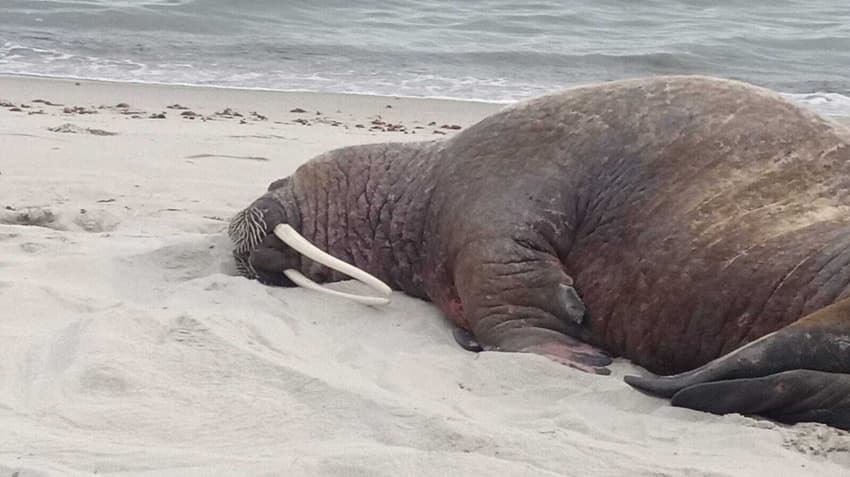Walrus makes rare stop on German beach to delight of locals

They normally live in the cold waters of the Arctic Circle, but a walrus made an unusual visit to the German island of Rügen on Thursday.
The two-metre long marine mammal rested on a beach on the north of the Baltic Sea island throughout the day on Thursday before heaving itself back into the water in the evening and swimming off.
"People were thrilled. You don't get an opportunity like that very often," said Michael Dähne, director for marine mammals at the German Maritime Museum on Friday.
After a beachgoer reported the unusual sighting on Thursday morning, the museum immediately sent its experts up to investigate.
The section of beach where the mammoth animal had landed was cordoned off as to prevent curious onlookers from disturbing it. "Everyone behaved exceptionally," Dähne said.
The walrus was likely a female and appeared to be in good health, Dähne said. "It had no noticeable injuries, was a normal size for the time of year and was breathing normally, he added.
Growing up to three and a half metres long, the Atlantic walrus is smaller than its pacific cousin, but can still weigh up to a tonne.
Far from natural habitat
Why the walrus swam as far south as Rügen is unclear.
According to Dähne, this was the first time he was aware of that a walrus had been spotted in Mecklenburg-Western Pomerania.
While one walrus had been spotted north of Lübeck near to where the Baltic meets the North Sea, it is rare for this Arctic animal to have swum so far into the Baltic.
One explanation is that the animal simply wandered off somewhere new.
The Maritime Museum in Stralsund certainly has experience with such exotic guests. In 1965, a leatherback turtle from the Caribbean wandered into the Baltic Sea and died shortly after being rescued.
The animal, named after film diva Marlene Dietrich, was taxidermied and became one of the original exhibits in the Maritime Museum.
In 2020, a huge swordfish was recovered from a fish trap near the harbour of Wismar.
Another possible explanation is that the animal was seeking new territory due to habitat loss as a result of climate change.
Experts say that the decline of sea ice due to climate change could become a problem for walruses.
"When the ice recedes, there is simply less ice and fewer ice holes," explained Dähne.
Walruses are mostly native to the polar regions of the Atlantic and Pacific oceans.
The closest region where walruses are common is Norway, where the population has rebounded significantly since the Norwegian government banned commercial hunting last century.
READ ALSO: Arctic expedition returns to Germany with sobering discoveries
Comments
See Also
The two-metre long marine mammal rested on a beach on the north of the Baltic Sea island throughout the day on Thursday before heaving itself back into the water in the evening and swimming off.
"People were thrilled. You don't get an opportunity like that very often," said Michael Dähne, director for marine mammals at the German Maritime Museum on Friday.
After a beachgoer reported the unusual sighting on Thursday morning, the museum immediately sent its experts up to investigate.
The section of beach where the mammoth animal had landed was cordoned off as to prevent curious onlookers from disturbing it. "Everyone behaved exceptionally," Dähne said.
The walrus was likely a female and appeared to be in good health, Dähne said. "It had no noticeable injuries, was a normal size for the time of year and was breathing normally, he added.
Growing up to three and a half metres long, the Atlantic walrus is smaller than its pacific cousin, but can still weigh up to a tonne.
Far from natural habitat
Why the walrus swam as far south as Rügen is unclear.
According to Dähne, this was the first time he was aware of that a walrus had been spotted in Mecklenburg-Western Pomerania.
While one walrus had been spotted north of Lübeck near to where the Baltic meets the North Sea, it is rare for this Arctic animal to have swum so far into the Baltic.
One explanation is that the animal simply wandered off somewhere new.
The Maritime Museum in Stralsund certainly has experience with such exotic guests. In 1965, a leatherback turtle from the Caribbean wandered into the Baltic Sea and died shortly after being rescued.
The animal, named after film diva Marlene Dietrich, was taxidermied and became one of the original exhibits in the Maritime Museum.
In 2020, a huge swordfish was recovered from a fish trap near the harbour of Wismar.
Another possible explanation is that the animal was seeking new territory due to habitat loss as a result of climate change.
Experts say that the decline of sea ice due to climate change could become a problem for walruses.
"When the ice recedes, there is simply less ice and fewer ice holes," explained Dähne.
Walruses are mostly native to the polar regions of the Atlantic and Pacific oceans.
The closest region where walruses are common is Norway, where the population has rebounded significantly since the Norwegian government banned commercial hunting last century.
READ ALSO: Arctic expedition returns to Germany with sobering discoveries
Join the conversation in our comments section below. Share your own views and experience and if you have a question or suggestion for our journalists then email us at [email protected].
Please keep comments civil, constructive and on topic – and make sure to read our terms of use before getting involved.
Please log in here to leave a comment.